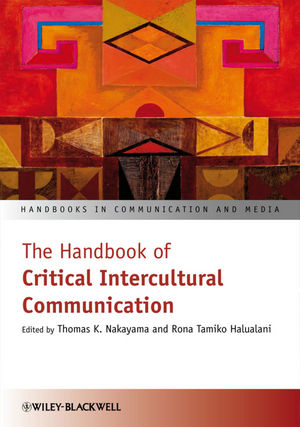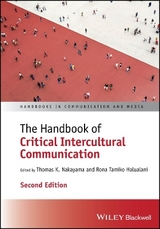
The Handbook of Critical Intercultural Communication
Wiley-Blackwell (Verlag)
978-1-4051-8407-6 (ISBN)
- Titel erscheint in neuer Auflage
- Artikel merken
The Handbook of Critical Intercultural Communication aims to furnish scholars with a consolidated resource of works that highlights all aspects of the field, its historical inception, logics, terms, and possibilities.
A consolidated resource of works that highlights all aspects of this developing field, its historical inception, logics, terms, and possibilities
Traces the significant historical developments in intercultural communication
Helps students and scholars to revisit, assess, and reflect on the formation of critical intercultural communication studies
Posits new directions for the field in terms of theorizing, knowledge production, and social justice engagement
Rona Tamiko Halualani is Associate professor in Department of Communication Studies at San Jose State University. She is the author of In the Name of Hawaiians: Native Identities and Cultural Politics (U Minn 2002) and publishes widely on issues of intercultural contact, race relations, and diversity. In 2005, Dr. Halualani was selected as a 2005-06 Carnegie Scholar by the prestigious Carnegie Foundation for the Advancement of Teaching (located at Stanford University). Thomas K. Nakayamais currently professor in the Hugh Downs School of Human Communication and founding director of Asian Pacific American Studies at Arizona State University. He is the author of numerous books and is currently the editor of the Journal of International and Intercultural Communication. He is a fellow of the International Academy of Intercultural Research, a former Fulbrighter at the Université de Mons-Hainaut in Belgium, Libra Professor at the University of Maine, and he served on the Board of Directors of the Arizona Humanities Council.
Notes on Contributors. Acknowledgments.
1. Critical Intercultural Communication Studies: At a Crossroads (Rona Tamiko Halualani, San José State University, and Thomas K. Nakayama, Northeastern University).
Part I: Critical Junctures and Reflections In Our Field: A Revisiting:.
2. Writing the Intellectual History of Intercultural Communication (Wendy Leeds-Hurwitz, University of Wisconsin-Parkside).
3. Critical Reflections on Culture and Critical Intercultural Communication (Dreama G. Moon, California State University, San Marcos).
4. Reflecting Upon “Enlarging Conceptual Boundaries: A Critique of Research in Intercultural Communication” (Alberto González, Bowling Green State University).
5. Intercultural Communication Dialectics Revisited (Judith N. Martin, Arizona State University, and Thomas K. Nakayama, Northeastern University).
6. Reflections on “Problematizing ‘Nation’ in Intercultural Communication Research” (Kent A. Ono, University of Illinois at Urbana-Champaign).
7. Reflections on “Bridging Paradigms: How Not to Throw Out the Baby of Collective Representation with the Functionalist Bathwater in Critical Intercultural Communication” (S. Lily Mendoza, Oakland University).
8. Revisiting the Borderlands of Critical Intercultural Communication (Leda Cooks, University of Massachusetts, Amherst).
9. Expanding the Circumference of Intercultural Communication Study (William J. Starosta, Howard University, and Guo-Ming Chen, University of Rhode Island).
Part II: Critical Dimensions in Intercultural Communication Studies:.
10. Internationalizing Critical Race Communication Studies: Transnationality, Space, and Affect (Raka Shome, New York University).
11. Re-imagining Intercultural Communication in the Context of Globalization (Kathryn Sorrells, California State University, Northridge).
12. Culture as Text and Culture as Theory: Asiacentricity and Its Raison D’être in Intercultural Communication Research (Yoshitaka Miike, University of Hawai‘i, Hilo).
13. Entering the Inter: Power Lines in Intercultural Communication (Aimee Carrillo Rowe, University of Iowa).
14. Speaking of Difference: Language, Inequality and Interculturality (Crispin Thurlow, University of Washington, Seattle).
15. Speaking Against the Hegemony of English: Problems Ideologies, and Solutions (Yukio Tsuda, University of Tsukuba).
16. Coculturation: Toward A Critical Theoretical Framework of Cultural Adjustment (Melissa L. Curtin, University of California, Santa Barbara).
17. Public Memories in the Shadow of the Other: Divided Memories and National Identity (Jolanta A. Drzewiecka, Washington State University).
18. Critical Intercultural Communication, Remembrances of George Washington Williams, and the Rediscovery of Léopold II’s “Crimes Against Humanity” (Marouf Hasian, University of Utah).
Part III: Critical Topics in Intercultural Communication Studies:.
19. Situating Gender in Critical Intercultural Communication Studies (Lara Lengel, Bowling Green State University, and Scott C. Martin, Bowling Green State University).
20. Identity and Difference: Race and the Necessity of the Discriminating Subject (Ronald L. Jackson II, University of Illinois at Urbana-Champaign, and Jamie Moshin, University of Washington).
21. Br(other) in the Classroom: Testimony, Reflection, and Cultural Negotiation (Bryant Keith Alexander, California State University Los Angeles).
22. When Frankness Goes Funky: Afro-Proxemics Meets Western Polemics at the Border of the Suburb (Jim Perkinson, University of Oakland, Michigan).
23. Iterative Hesitancies and Latinidad: The Reverberances of Raciality (Bernadette Marie Calafell, University of Denver, and Shane T. Moreman, California State University, Fresno).
24. We Got Game: Race, Masculinity, and Civilization in Professional Team Sport (Lisa A. Flores, University of Colorado, Boulder, Karen Lee Ashcraft, University of Utah, and Tracy Marafiote, State University of New York at Fredonia).
25. It Really Isn’t About You: Whiteness and the Dangers of Thinking You Got It (John T. Warren, Southern Illinois University, Carbondale).
26. Critical Reflections on a Pedagogy of Ability (Deanna L. Fassett, San José State University).
27. The Scarlet Letter, Vigilantism, and the Politics of Sadism (Richard Morris, Arizona State University).
28. Authenticity and Identity in the Portable Homeland (Victoria Chen, San Francisco State University).
29. Layers of Nikkei: Japanese Diaspora and World War II (Etsuko Kinefuchi, University of North Carolina at Greensboro).
30. Placing South Asian Digital Diasporas in Second life (Radhika Gajjala, Bowling Green State University).
31. “The Creed of the White Kid”: A Diss-apology (Melissa Steyn, University of Cape Town).
32. A Critical Reflection on an Intercultural Communication Workshop: Mexicans and Taiwanese Working on the US-Mexico Border (Hsin-I Cheng, Santa Clara University).
33. “Quit Whining and Tell Me About Your Experiences!”: (In)Tolerance, Pragmatism, and Muting in Intergroup Dialogue (Sarah DeTurk, University of Texas at San Antonio).
34. A Proposal for Concerted Collaboration between Critical Scholars of Intercultural and Organizational Communication (Brenda J. Allen, University of Colorado, Denver).
Part IV: Critical Visions of Intercultural Communication Studies:.
35. Conclusion: Envisioning the Pathway(s) of Critical Intercultural Communication Studies (Thomas K. Nakayama, Northeastern University, and Rona Tamiko Halualani, San José State University).
Index.
| Erscheint lt. Verlag | 10.12.2010 |
|---|---|
| Reihe/Serie | Handbooks in Communication and Media |
| Verlagsort | Hoboken |
| Sprache | englisch |
| Maße | 178 x 254 mm |
| Gewicht | 1293 g |
| Themenwelt | Geisteswissenschaften ► Sprach- / Literaturwissenschaft ► Sprachwissenschaft |
| Sozialwissenschaften ► Kommunikation / Medien ► Allgemeines / Lexika | |
| Sozialwissenschaften ► Soziologie ► Mikrosoziologie | |
| ISBN-10 | 1-4051-8407-8 / 1405184078 |
| ISBN-13 | 978-1-4051-8407-6 / 9781405184076 |
| Zustand | Neuware |
| Informationen gemäß Produktsicherheitsverordnung (GPSR) | |
| Haben Sie eine Frage zum Produkt? |
aus dem Bereich



